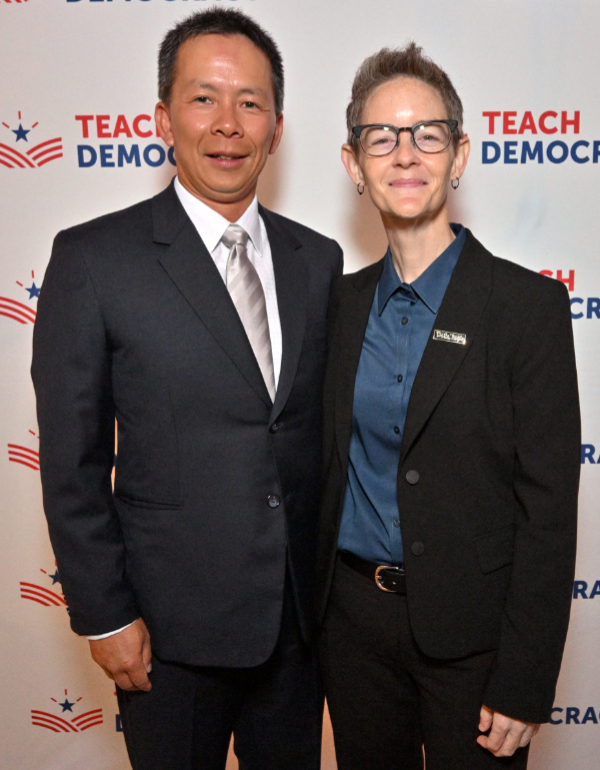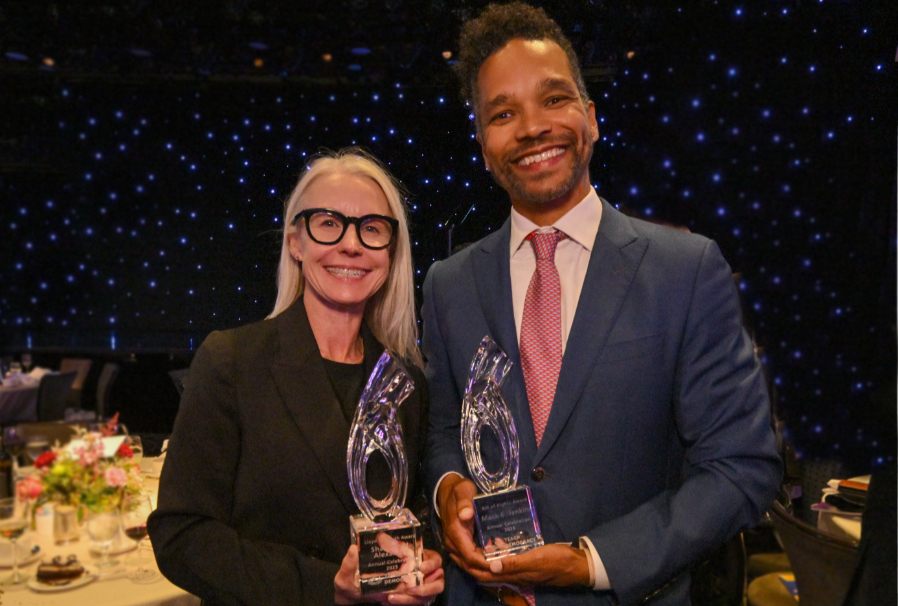Democracy Doesn’t Teach Itself
At a time when civic trust is eroding, misinformation spreads faster than facts, and division is often prioritized over dialogue, Teach Democracy’s 2025 Annual Celebration offered something rare: clarity, courage, and a plan.
The 62-year-old nonpartisan organization gathered over 500 leaders from law, education, business, and public service in Los Angeles on September 30 not just to honor individuals but to reassert a fundamental truth: democracy must be taught, practiced, and protected. Across speeches, student performances, and conversations, the message was unmistakable: civic education is not a luxury. It is a public imperative.
The Risk of Ignorance and the Power of Knowing
In her first address as CEO, Stephanie Doute shared a deeply personal story about discovering her own civic voice, and the transformative power of understanding how democracy works. Doute reminded the audience what is at stake when civic education is left to chance.
“Democracy should not be a mystery,” she said. “It shouldn’t be a secret passed down through chance or privilege. It should be taught — clearly, openly, powerfully — to everyone.”
Doute’s remarks also called attention to the vast gap between what Americans say they value and what they fund. Despite overwhelming bipartisan support for civic education, she noted, government and philanthropic spending tell another story. For every $50 spent by government and philanthropy on STEM education, just five cents have been allocated to civics education.

That imbalance, she argued, isn’t just a budget line. It’s an indicator of national priorities. Teach Democracy is working to change that.
Not Just Honored — Inspired
The evening’s honorees illustrated what civic commitment looks like across generations.
Shannon Alexander, recipient of the Lloyd M. Smith Award, was honored not only for her leadership within Teach Democracy, but for her unwavering belief in the transformative impact of civic education. She spoke of students gaining the tools to engage in civil discourse, critically evaluate information, and participate in shaping their communities. In a moment when these skills are often in short supply, Alexander’s remarks underscored the urgent relevance of Teach Democracy’s nonpartisan mission.
Mack E. Jenkins, recipient of the Bill of Rights Award, delivered a stirring call to conscience on service, legacy, and responsibility. Reflecting on his grandfather’s survival of the attack on Pearl Harbor, he connected his family’s history to the unfinished work of American democracy. He spoke of inherited courage, quiet service, and the enduring obligation to protect the freedoms others fought to secure.
Jenkins challenged the audience to consider what it truly means to inherit a democracy, not through ceremony, but through action. His remarks reminded the room that civic education and participation are not symbolic gestures. They are a responsibility to our past and our future.

Students at the Center
True to its mission, Teach Democracy made sure that students were front and center. A performance by Chapman Elementary students turned the Declaration of Independence into an escape room challenge, giving attendees a glimpse of what real civic engagement looks like in the classroom: active, joyful, and deeply informed.
It was a poignant reminder that when young people are equipped with knowledge and agency, they don’t wait for permission to participate. They begin shaping the world.
Teaching, Not Telling
In a political environment where outrage often overshadows understanding, Teach Democracy’s work stands apart. Its nonpartisan curriculum, national programs, and educator networks focus on constitutional literacy, civil discourse, and critical thinking. The organization doesn’t tell students what to think but gives them the tools to think for themselves.
That distinction was underscored by the evening’s principled, nonpartisan, and hopeful tone, grounded in the conviction that civic knowledge is not optional if democracy is to survive and thrive.
The Work Ahead
The Annual Celebration was not just a fundraiser or a moment of recognition. It was a declaration that our democracy, imperfect and unfinished, requires investment. In teachers. In students. In education that prepares people not just to vote, but to govern, participate, and lead.
Former U.S. Secretary of Homeland Security Alejandro Mayorkas closed the evening with a reflection on that very point. Drawing from his own journey as a political refugee and public servant, he reminded attendees that democratic institutions endure only when each generation is prepared to carry them forward. Through education, he said, we not only transmit knowledge, but we also preserve freedom.
As CEO Stephanie Doute said, “Democracy does not happen to us. It happens through us.”
————
Teach Democracy thanks our sponsors, donors, and attendees for making this year’s celebration a success and for their continued commitment to civic learning. Click here to see more about the Annual Celebration.